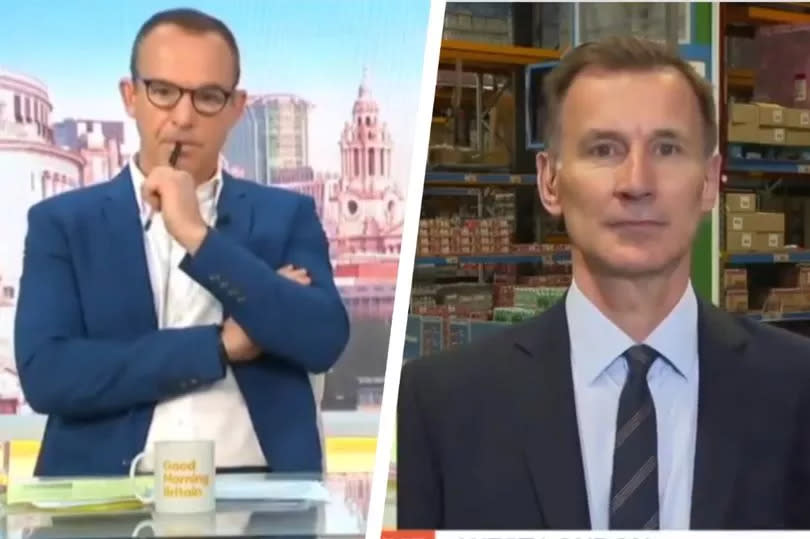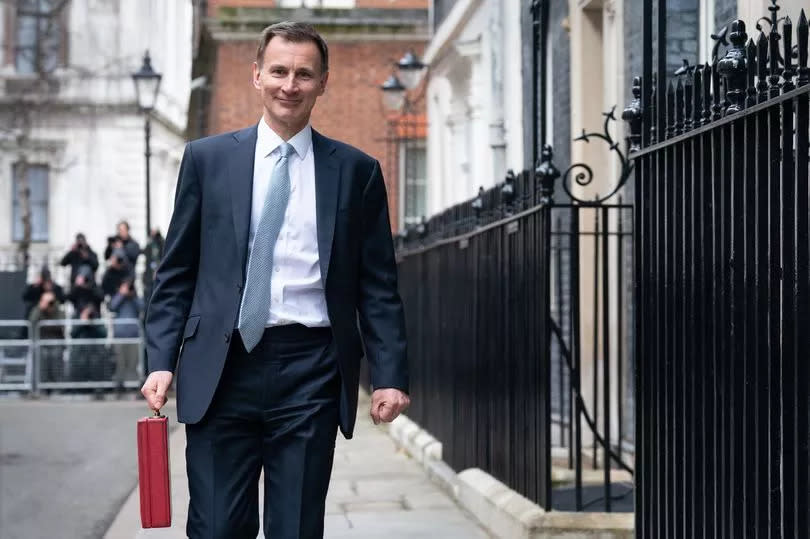Martin Lewis explains which groups are 'hardest hit' by inflation as he grills chancellor

Martin Lewis has grilled chancellor Jeremy Hunt over high interest rates, energy prices, and this morning's inflation figures, which showed the rate at which prices are increasing has fallen to 2.3 per cent.
During Wednesday's episode of ITV's Good Morning Britain, much to the finance guru's embarrassment, presenter Susanna Reid repeatedly called her co-host "the people's chancellor" ahead of his interview with Chancellor of the Exchequer Jeremy Hunt.
The interview did not get off to a smooth start. After being asked about the inflation figures, Mr Hunt started to say: "It's obviously going in the right direction and that is very encouraging, and when the Bank of England, sorry excuse me a moment..." At this, his phone started to ring, causing the Chancellor to reach into his pocket. Quickly, Martin jumped in: "Is that the Prime Minister?"
READ MORE: Martin Lewis gives interest rate verdict as inflation falls but target 'not hit'
Switching his phone off, Mr Hunt replied: "I probably said the wrong thing there didn't I? That was the Prime Minister on the phone trying to correct me."
He went on to say: "The Bank of England will start to cut interest rates, as you know they decide that independently, when they are confident that it is sustainably at its target. So today is good news for mortgage holders because it does give people more confidence that inflation is returning to more normal levels.
"Precisely when it happens, obviously, I don't know. But the Governor of the Bank of England has been very clear that the next move in interest rates will be down and he doesn't expect it to be too far away."
However, prices on supermarket shelves are not set to decrease, meaning shoppers across the country will continue to pay high prices for food and other consumer goods after prices rose by more than 11 per cent in a year.
Mr Hunt warned that it would "take time" for people to feel the benefit. He said: "Even though the inflation rate has come down and people will be relieved about that, the level of prices is still a lot higher than it was one or two years ago.
"Now obviously for many people, their wages will also have gone up in that period, but overall we are not expecting them to catch up fully until the first part of next year, that's when living standards will get back to their pre-pandemic levels."

Before the Chancellor came on GMB, Martin explained to viewers how inflation had hit different parts of society worse than others. He said: "Renters are probably the hardest hit by all of this, unlike mortgages where you can get all of the big banks in a room and bang their heads together, you can't do that because it's an individual relationship between landlords and renters.
"It is quite difficult to feel the benefit of lower inflation because lower inflation means that prices are still rising, perhaps a more accurate phrase would be that people are stopping feeling increased pain."
However, with an immediate interest rate cut from the Bank of England less likely, some homeowners will continue to struggle. Martin added: "I think it's worth people understanding something about interest rates and mortgages.
"Very roughly, a third of the country rent, a third of the country own outright and are therefore unaffected by mortgage rates on their houses, and a third of the country have mortgages. Of the third of the country that have mortgages, most are on fixed rates - so interest rate changes do not affect them immediately, only when they come off the fixed rate."
But why do interest rates have such a large effect on people's lives? Martin explained that this is not a side effect, but the point, saying: "When you are talking about affecting debt and mortgages especially, interest rate policy has to affect a very small number of people quite substantially for it to work.
"So the people on variable mortgages or coming off fixed have felt so much pain at the rises in fixed rates, people say to me this is unfair, it's not unfair its deliberate.
"The cost of your mortgage hasn't gone up as a by-product, your mortgage has gone up as a deliberate policy to take money out of the economy and bring inflation down."

 Yahoo News
Yahoo News 
